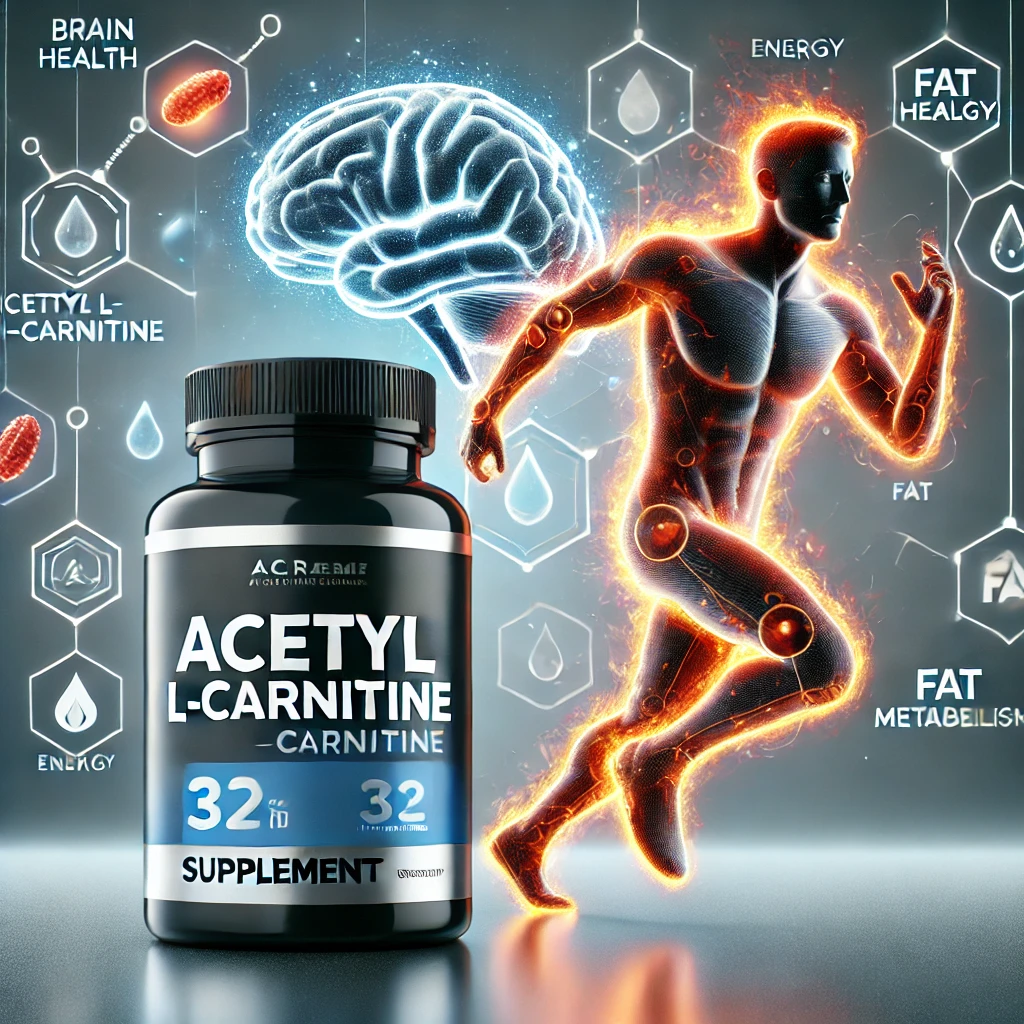When it comes to fat-burning supplements, Acetyl L Carnitine vs Carnitine for fat loss is a debate that many fitness enthusiasts and health-conscious individuals encounter. Understanding the key differences between these two can unlock your potential for more effective weight management and enhanced physical performance.
But how do you choose the right one for your goals? Whether you’re aiming to shred fat or boost energy, this comparison will help you make an informed decision.
So, which form of carnitine truly accelerates fat loss and supports your fitness journey? Keep reading to find out.

Table of Contents
Quick Comparison
Acetyl L-Carnitine, often referred to as ALCAR, is known for its impressive ability to enhance absorption and cross the blood-brain barrier. This unique property makes ALCAR particularly effective not only for cognitive and neurological benefits but also for fitness. But what are the Acetyl L Carnitine benefits for fitness?
In addition to improving memory and offering neuroprotective effects, Acetyl L Carnitine benefits for fitness include increased energy production and enhanced fat metabolism. Athletes and fitness enthusiasts often turn to ALCAR for its potential to support mental focus during intense workouts, improve endurance, and aid in quicker recovery. With its dual-action benefits on both the body and mind, it’s a supplement that can truly elevate your performance.
Key points about Acetyl L-Carnitine:
- Better absorption and ability to cross the blood-brain barrier
- Beneficial for cognitive health, including memory enhancement
- Potential neuroprotective effects
- Fat metabolism
Carnitine: General Energy and Metabolic Support
Carnitine, on the other hand, is primarily recognized for its vital role in energy metabolism. It helps transport fatty acids into the mitochondria for energy production, making it an essential compound for boosting physical performance. But is it the best supplement for energy and focus 2025? For athletes and individuals looking to optimize their workouts or improve weight management, Carnitine is a go-to choice.
With its ability to enhance energy levels and support mental clarity, it’s no wonder why many turn to Carnitine to fuel their fitness journey. So, could this be the energy-boosting solution you’ve been searching for?
Key points about Carnitine:
- Supports the transportation of fatty acids into mitochondria
- Aids in energy production, beneficial for physical performance
- Often used for weight management and muscle recovery

Weight Loss And Muscle Development
When evaluating Carnitine vs Acetyl L Carnitine for fat loss, understanding how each supplement impacts fat burning and muscle development is key. Both Acetyl L-Carnitine and Carnitine are popular choices for those aiming to shed fat and enhance muscle growth. However, they work in distinct ways within the body. Acetyl L-Carnitine is often preferred for its ability to cross the blood-brain barrier, providing additional cognitive benefits, while Carnitine is more directly involved in energy metabolism and fat transport.
So, which one is better suited for your fat loss journey—Acetyl L Carnitine or Carnitine? Let’s break down the differences to help you make the best decision.
Carnitine: A Key Player in Fat Burning and Muscle Development
Carnitine is primarily known for its crucial role in fat metabolism. It helps transport fatty acids into the mitochondria, where they are burned for energy. This process is essential for fat burning, especially during exercise, which is why Carnitine vs Acetyl L Carnitine for fat loss is a frequent topic among fitness enthusiasts. But which one is truly more effective for shedding those extra pounds?
Beyond fat burning, Carnitine also supports muscle recovery by reducing soreness and aiding in post-exercise repair. Its ability to enhance endurance and stamina makes it a favorite among athletes looking to push their limits while accelerating muscle development.
So, does Carnitine vs Acetyl L Carnitine for fat loss really make a difference in your fat loss journey? Let’s break down the benefits to see which one could give you the edge you need.
Key Points About Carnitine in Weight Loss and Muscle Development:
- Transports fatty acids into mitochondria for fat burning
- Helps increase energy availability during workouts
- Aids in muscle recovery and reduces soreness

Acetyl L-Carnitine: Supporting Muscle Health and Weight Management
Acetyl L-Carnitine, while also playing a role in fat metabolism, is primarily recognized for its powerful neurological benefits. However, its impact on energy metabolism can indirectly support muscle health and weight management. By enhancing mitochondrial efficiency, ALCAR helps improve endurance and physical performance—key factors for anyone serious about fitness.
But how does it compare to L Carnitine supplements for athletes? While L Carnitine is well-known for its direct role in fat burning and energy production, ALCAR takes it a step further by reducing metabolic waste buildup during exercise. This can lead to better muscle recovery, improved workout efficiency, and sustained performance over time.
Could Acetyl L Carnitine be the missing piece in your fitness strategy? Let’s dive deeper into how it stacks up against traditional L Carnitine for muscle and fat loss.
Key Points About Acetyl L-Carnitine In Weight Loss And Muscle Development:
- Enhances energy production, supporting improved physical performance
- May help in reducing metabolic waste during exercise
- Supports overall muscle health and endurance

Health Benefits Comparison
Acetyl L-Carnitine: Cognitive And Neurological Health
Acetyl L-Carnitine, widely known for its cognitive benefits, is a powerhouse when it comes to enhancing brain function. It has been shown to improve memory, increase alertness, and provide neuroprotective effects, making it a go-to supplement for those looking to boost mental clarity and long-term brain health.
But did you know that Acetyl L Carnitine benefits for fitness go beyond just cognitive function? By supporting mitochondrial energy production, ALCAR plays a role in reducing fatigue, enhancing endurance, and improving recovery—key factors for athletes and fitness enthusiasts striving for peak performance. Whether you’re looking to optimize brainpower or fuel your workouts, ALCAR delivers a powerful combination of mental and physical benefits.
Key points about Acetyl L-Carnitine’s health benefits:
- Enhances memory and alertness
- Provides neuroprotective benefits
- Potentially beneficial in treating neurological conditions

Carnitine: Physical Health And Exercise Performance
Carnitine is widely recognized for its impact on physical performance and energy metabolism. By transporting fatty acids into the mitochondria, it plays a crucial role in energy production, which directly influences endurance and workout efficiency. But when it comes to Carnitine vs Acetyl L Carnitine for fat loss, which one truly delivers better results?
Studies suggest that L-Carnitine supplementation can improve endurance, reduce muscle soreness, and accelerate post-exercise recovery. This is why L Carnitine supplements for athletes have become a go-to choice for those aiming to optimize fat metabolism while maintaining peak performance. Whether you’re pushing through intense workouts or looking to enhance recovery, Carnitine provides the support needed to elevate your fitness journey.
Key points about Carnitine’s health benefits:
- Improves endurance and exercise performance
- Aids in reducing muscle soreness post-exercise
- Supports better recovery and physical performance

Benefits In Exercise And Training
When it comes to optimizing both mind and body, Acetyl L Carnitine benefits for fitness go beyond just fat metabolism. While not as directly linked to fat burning as L-Carnitine, ALCAR plays a crucial role in enhancing cognitive function, reducing fatigue, and supporting muscle recovery—key factors for peak athletic performance.
By improving mitochondrial energy production, Acetyl L Carnitine helps sustain endurance during workouts and minimizes oxidative stress, allowing for more efficient training sessions. For those looking to sharpen their mental focus while maximizing physical output, ALCAR serves as a powerful supplement that bridges the gap between brainpower and muscle performance.
Cognitive Enhancement for Better Training Focus
One of the standout benefits of Acetyl L Carnitine in an exercise context is its ability to enhance cognitive function. Improved brain health leads to sharper focus and better concentration during workouts, allowing for more effective and controlled training sessions. But how does it compare to L Carnitine supplements for athletes when it comes to overall performance?
While ALCAR sharpens mental clarity, L Carnitine directly supports energy metabolism and endurance. For athletes looking to maximize both mind and body, combining these two supplements may offer the ultimate advantage—boosting workout intensity, optimizing recovery, and enhancing overall training efficiency. Could this be the missing link in your performance strategy?
Key Points about Acetyl L-Carnitine In Exercise And Training:
- Improves focus and concentration during exercise
- Enhances cognitive function, which can indirectly benefit training

Benefits Of Carnitine In Exercise And Training
When it comes to enhancing workout performance, Acetyl L Carnitine vs Carnitine is a common debate in the fitness world. Carnitine is more directly associated with exercise benefits, thanks to its critical role in fat metabolism and energy production. By transporting fatty acids into the mitochondria, it helps fuel your muscles, leading to improved endurance, reduced fatigue, and faster recovery.
But is Carnitine alone enough, or does Acetyl L Carnitine offer additional advantages for athletes? Understanding the difference can help you maximize both energy output and overall performance—so which one is right for your training goals?
Enhanced Fat Burning and Energy Production
Carnitine’s primary role in transporting fatty acids into the mitochondria for energy production is crucial during exercise. This process not only enhances fat burning but also improves overall energy levels, making workouts more effective and efficient.
Improved Physical Performance and Recovery
Additionally, Carnitine has been shown to improve physical performance, particularly in endurance sports. It aids in reducing muscle soreness and enhances recovery post-exercise, making it a valuable supplement for athletes and fitness enthusiasts.
Key Points about Carnitine in Exercise and Training:
- Directly involved in fat burning and energy production
- Improves endurance and physical performance

Acetyl L- Carnitine Pros & Cons
Pros
✅ Crosses the blood-brain barrier for superior cognitive boost
✅ Enhances nerve regeneration and mitochondrial health
✅ Reduces exercise-induced oxidative stress
✅ Potential anti-aging & longevity benefits
Cons
❌ May cause insomnia if taken late in the day
❌ Can interfere with Thyroid hormone levels
❌ Not ideal for those sensitive to stimulatory effects
Carnitine Pros & Cons
✅ Boosts oxygen supply to muscles for enhanced endurance
✅ Supports heart health by improving fatty acid utilization
✅ May reduce muscle damage and Speed up recovery
✅ Enhances blood flow for Better nutrient delivery
Cons
❌ may cause mild stomach upset in sensitive individuals
❌ long-term use could potentially affect kidney function
❌ may lead to a fishy body odor in some users
❌ not ideal for people with certain metabolic disorders

Which One Should I Take Acetyl L-Carnitine or Carnitine?
In this blog post we have take a fast look over theese two supplements, But wich one is the right to choose? let me help you by this quick overview.
If Your Focus is on Cognitive Health and Neuroprotection
- Choose Acetyl L-Carnitine: If you’re looking for a supplement that supports brain health, enhances memory, and provides neuroprotective benefits, Acetyl L Carnitine is the more suitable choice. It’s particularly beneficial for those looking to improve cognitive function or deal with neurological issues.
If Your Focus Is On Physical Performance And Fat Burning
- Choose Carnitine: For individuals aiming to enhance their physical performance, endurance, and specifically target fat burning during workouts, Carnitine is the preferable option. It plays a direct role in energy production and is beneficial for athletes or those engaged in regular physical activity.
For a Balanced Approach
- Consider Both: Depending on your needs, you might find value in taking both supplements, as they offer complementary benefits.
FAQs
What is The difference between Acetyl L-Carnitine and L-Carnitine?
The key difference is that ALCAR crosses the blood-brain barrier, making it more effective for brain function and neurological health, while L Carnitine is primarily used for physical performance and fat metabolism.
Which One is Better For Fat Loss—Acetyl L-Carnitine or L-Carnitine?
L-Carnitine is more effective for fat metabolism since it helps transport fatty acids into the mitochondria for energy. Acetyl L Carnitine, while still beneficial for energy, is better known for cognitive and neurological benefits.
Can I Take Acetyl L-Carnitine and L-Carnitine together?
Yes, Many people combine them to get the best of both worlds—L Carnitine for fat burning and endurance, and Acetyl L Carnitine for brain function and focus.
Conclusion
When choosing between Acetyl L-Carnitine and Carnitine, consider your goals: Acetyl L-Carnitine is best for cognitive health, while Carnitine is better for physical performance and fat burning. A common question is whether you can take both together for enhanced results – it’s possible, but it’s best to consult with a healthcare professional for proper dosage.
So, are they worth buying? If you want to boost mental clarity, go for Acetyl L-Carnitine. For improved exercise and fat burning, choose Carnitine. Have you tried either of these? Feel free to share your experience in the comments







